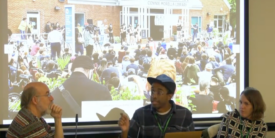Jennifer
If you haven’t already seen this Washington Post infographic, it’s brilliant. It’s nominally about the search for Malaysia Airlines flight 370. But the story it actually tells is just how mysterious and unknowable the deep ocean remains.
Plus, UW researchers have developed new software to show what a child will look like as he or she ages. Cool or creepy? You be the judge.
Because I am one of the 7 percent who would be affected by the city of Seattle’s proposed small lot legislation, I encourage other homeowners living on smaller lots to check out these perpsectives here, here, and here. I, incorrectly, thought new rules would only apply to teardowns and new construction, but the city is also proposing to limit heights of existing homes on small lots. How a small number of cranky neighbors managed to prevent many more middle-class homeowners (potentially) from expanding their homes to accommodate growing families or aging parents is, frankly, completely baffling. As are DPD’s supporting documents, which make it nearly impossible for an average homeowner to figure out how they might apply.
Finally, here is a sampling of the incomparable photographs made by Anja Niedringhaus, the AP photographer and my friend killed in Afghanistan last week. Anja went to war zone after war zone because she believed that people needed to see what happened there, and no one captured that reality in the same way. She will be missed, terribly.
Alan
Rebecca Solnit has again produced an essay of bracing moral clarity. It’s called, “Call Climate Change What It Is: Violence.”
Exxon says:
We are confident that none of our hydrocarbon reserves are now or will become ‘stranded’. We believe producing these assets is essential to meeting growing energy demand worldwide.
Stranded assets that mean carbon assets—coal, oil, gas still underground—would become worthless if we decided they could not be extracted and burned in the near future. Because scientists say that we need to leave most of the world’s known carbon reserves in the ground….
Exxon has decided to bet that we can’t make the corporation keep its reserves in the ground, and the company is reassuring its investors that it will continue to profit off the rapid, violent and intentional destruction of the Earth.
Almost nothing is better than Solnit. But this is.
One reason for hopefulness, even for measured optimism, is something our hyper-knowing, reflexively cynical political culture trains us to forget: extraordinary politics is a real thing, not just an idle wish.
Consider the end of slavery—not in the U.S., but in the British Empire, which abolished the practice thirty years before the Emancipation Proclamation, by an act of Parliament, with compensation to slaveholders. The… economic cost was huge. For decades, historians assumed it must have been a subterfuge for someone’s economic benefit—otherwise, how would such a thing be possible? But the historians’ view these days is that British emancipation was, in fact, a wildly expensive and disruptive moral commitment, executed through extraordinary politics. The powerful thing about this example is its scale: the global economy of the British Empire was nearly as entwined with slavery as ours is with the fossil-fuel economy. The change wasn’t just costly: it pulled some institutions up by their roots. If that never happened, we’d really be out of reasons for hope on climate change. But sometimes it does.
(And I don’t just love it because I’ve been ending speeches for a decade by telling the story of the British emancipation movement.)
Eric
Jamestown S’Klallam elder Scott MacGregor had a heartfelt piece in opposition to the oil-by-rail terminal near Clatskanie, Oregon:
For the last few hundred years, the Columbia has been turned to human uses on a scale never seen before and at great expense to the habitat. Fueled by an apparently unbounded desire for dams, commerce, and now oil, we are choking the life out of the river. There are consequences for the entire planet.
Seattle historian Knute Berger had a heartfelt piece in support of preserving a portion of the old “ramps to nowhere” in the city’s Arboretum because they stand as wonderful monuments to anti-freeway activism. I wholeheartedly agree with Knute, not only because of their historic significance but also because of their quasi-illicit function as a summer playground for teenagers. (Note to the kids: they make for a terrific high-dive into Lake Washington.) Great cities need unsanitized places like this.
Worrisome news from the Bakken region of North Dakota: some of the shale oil may contain high levels of radioactive substances. Worse yet, oil companies are illegally disposing of the radioactive “filter socks,” in one case actually stashing them in an abandoned gas station.
Serena
If you have Showtime in your TV package, be sure to tune in as the Years of Living Dangerously series starts this Sunday. Unfamiliar? See the trailer here:
Just in case you needed another reason to go car-free, but especially if you own a Mazda.
In a video piece for The Guardian, Leah Green reverses sexist experiences on a bunch of unwitting men in London, based on real-life examples taken from the Everyday Sexism project. I personally have always wondered what guys who say stuff like this think they will actually achieve by such actions. Scientifically, what is their real success rate? How many women have smiled at their crudeness, turned around, and confidently invited them to a drink? Is that even their goal? And if not, what is?








David Kershner
Thank you, Alan, for alerting us to powerful essays by Rebecca Solnit and Jedediah Purdy on the subject of climate change. Speaking also about climate change and moral responsibility, Desmond Tutu writes this week in The Guardian that “To serve as custodians of creation is not an empty title; it requires that we act, and with all the urgency this dire situation demands.”
http://www.theguardian.com/commentisfree/2014/apr/10/divest-fossil-fuels-climate-change-keystone-xl